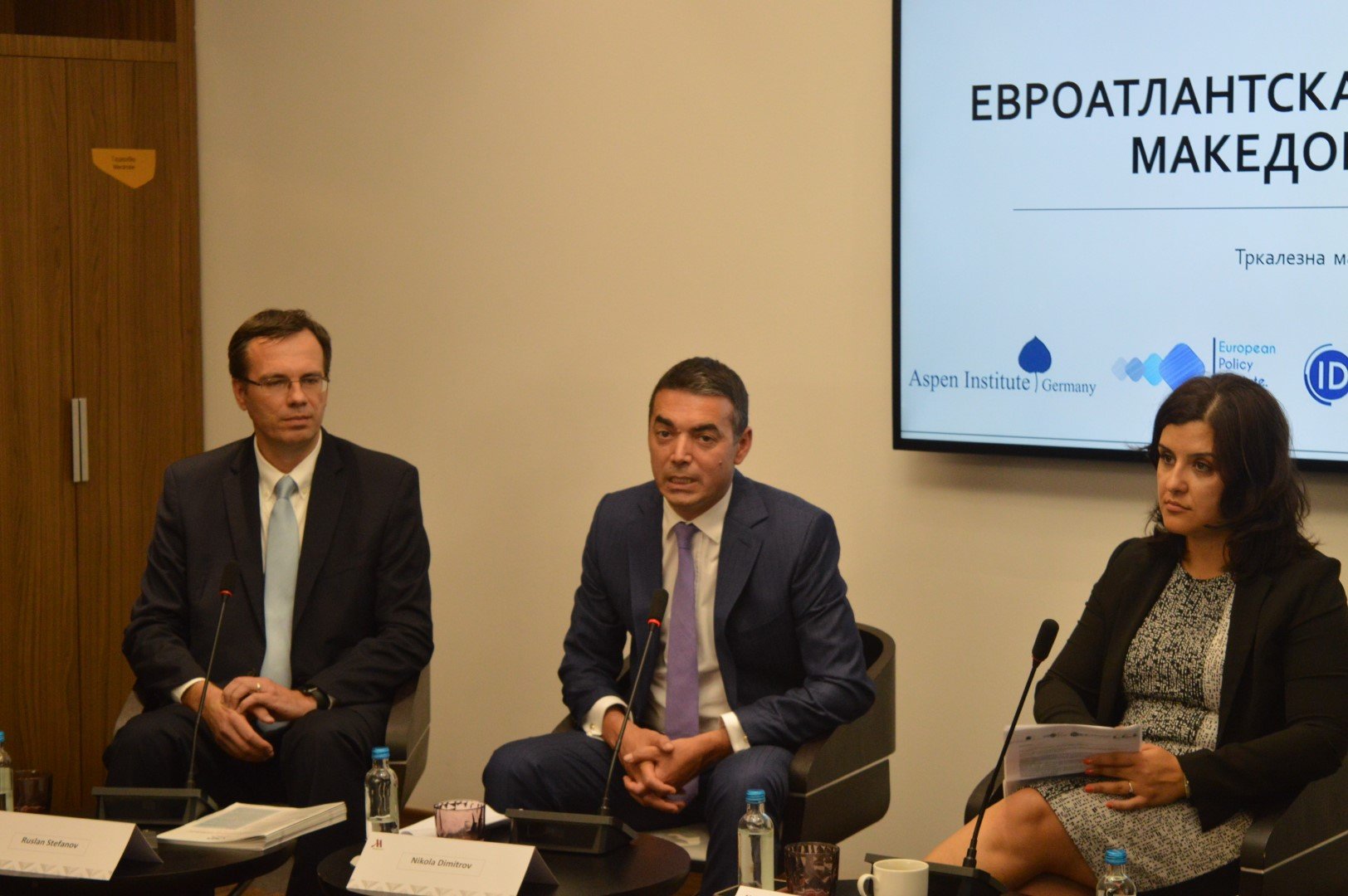On Monday (3rd of September, 2018) at hotel Merriott, a roundtable titled “Euro-Atlantic future for Macedonia?” was held, with the participation of Mr. Nikola Dimitrov, minister for foreign affairs of the Republic of Macedonia, Special Representative for Southeast Europe, Turkey and the countries of EFTA of FR Germany, ambassador D-r. Christian Hellbach, Mr. Nikola Poposki, president of the National Council for Euro-Integrations, as well as Mr. Ruslan Stefanovfrom Center for the Study of Democracy from Sofia. D-r. Simonida Kacarska, director of EPI moderated the debate.
The roundtable was organized by Aspen Institute from Berlin, the European Policy Institute – Skopje, Institute for democracy “Societas Civilis” – Skopje, as well as the Center for Economic Analyses, supported by the Ministry of Foreign Affairs of the Federal Republic of Germany.
The discussion at the roundtable focused on the upcoming referendum and the significance of its outcome, as well as the progress of the Republic Macedonia in relation to the Euro-Atlantic integrations. Representatives from institutions, foreign diplomatic missions, civil society and independent experts had the opportunity to ask questions and to engage in the discussion after the opening speeches of the speakers.
 Minister Dimitrov said he is convinced of the positive outcome of the referendum. However, in the case of a negative outcome from the referendum, he considers that it does not matter if there will be early parliamentary elections or not, because the country will not have a secure future. “We have decided courageously, honestly and openly to solve the problems. We have managed to close one dispute which was dragging us back three decades, and open the gates of the future. It is about our stability, security, our financial welfare and access to the best reform tool there is – the EU accession talks. The solution is here, it is up to us to decide whether we go forward, towards the future and integrations, or whether we go back towards isolation”, said minister Dimitrov for the press conference held before the event.
Minister Dimitrov said he is convinced of the positive outcome of the referendum. However, in the case of a negative outcome from the referendum, he considers that it does not matter if there will be early parliamentary elections or not, because the country will not have a secure future. “We have decided courageously, honestly and openly to solve the problems. We have managed to close one dispute which was dragging us back three decades, and open the gates of the future. It is about our stability, security, our financial welfare and access to the best reform tool there is – the EU accession talks. The solution is here, it is up to us to decide whether we go forward, towards the future and integrations, or whether we go back towards isolation”, said minister Dimitrov for the press conference held before the event.

During the roundtable, minister Dimitrov referred to the absence of position from the main opposition party for the referendum. “Of course the citizens will decide themselves, but we have a task to be honest and to come out and say ‘this is why we think this is a good thing for Macedonia’. This is not about the Government, or any political party. The question is about the future of Macedonia. And having no virtue and not stating your position loud and clear on this is very irresponsible, in my own view”, said Dimitrov during the discussion.
Representative of the German MFA Christian Hellbach asked the citizens and political parties not to miss the chance, because there is no plan B. “Your country has a Euro-Atlantic perspective. Sadly, your European integration was stuck for too long because of the name dispute. This question lasts too long, and not only it dragged your country back, it was also painful for us. We have an interest for bringing your country closer to EU and NATO, and not only your country, but the whole WB, and that interest is grounded on the security aspect, foremost,” said Hellbach during the press conference.

“This was the best news we got in the recent years from the WB, and we find the implementation of this Agreement very important. For us, you will stay Macedonians, speaking Macedonian language, and all of that is guaranteed in the agreement. We want to see you and be a part of Europe”, he added.
During the discussion, Mr. Hellbach referred to the inexplicable position of the largest opposition party for the referendum, and indicated that the decision of the opposition can make a difference for better or for worse, which is really serious and that all parties should bear responsibility for this moment.
The president of the National Council for Euro-Integrations and ex minister of foreign affairs, Nikola Poposki, said that the oppositions stands behind the position that the best choice for Macedonia is the Euro-Atlantic integration.

“However, if we want a national consensus, those who are part of the government should allow a critical perception of things. What is more important at the moment is to exit the myths and to be realistic”, said Poposki during the roundtable, regarding the question of the referendum. He added that the government must be ready to receive criticism and not divide the population in the sense of “if you are for EU and NATO, then you are with us” and “if you are not for NATO and EU, then you are not with us”.
Asked about the VMRO-DPMNE position on the referendum, he said that if he was deciding, then he would consult the membership in the party based on the principle – one member, one vote.
“It is very wrong if you have a difference between what the majority thinks and what the elite thinks. But when you do that, you have to openly inform them about the options. So, you would need to outline what are the bad sides of the Agreement, but also, to say what are the consequences of not implementing the Agreement”, he added.
However, the direction of Macedonia, according to Poposki is clear. “NATO will be a good signal of safety and security and will contribute to more investments. Entry in the EU will contribute to a better life for the citizens. At the end of the day, everything depends on us”, said Poposki regarding the strategic direction of the country.
Ruslan Stefanov from the Center for the Study of Democracy from Sofia conveyed his experience from the states that joined the European Union in the near past. “If we take a look at Bulgaria, Croatia, Romania and the other countries, we can see that not all problems were solved by entering the EU. But, using the benefits and instruments of the EU, states have improved the quality of life of their citizens”, said Stefanov.
 He added “we have seen many debates on the benefits of the EU, and the reality is that there are no other options for it. We are focused on what is common interest for all citizens, and this is the fight against corruption, better infrastructure and business conditions”.
He added “we have seen many debates on the benefits of the EU, and the reality is that there are no other options for it. We are focused on what is common interest for all citizens, and this is the fight against corruption, better infrastructure and business conditions”.






